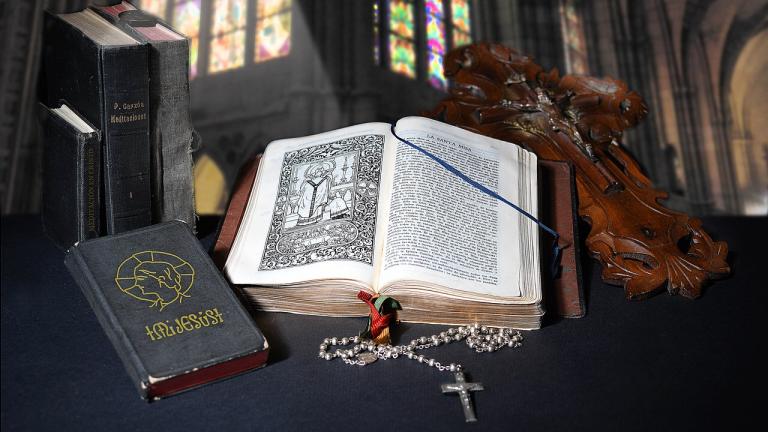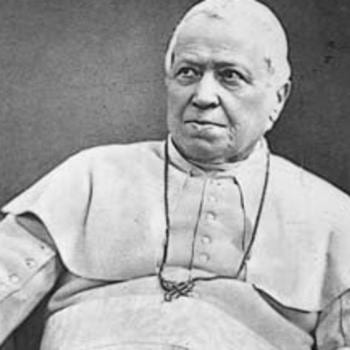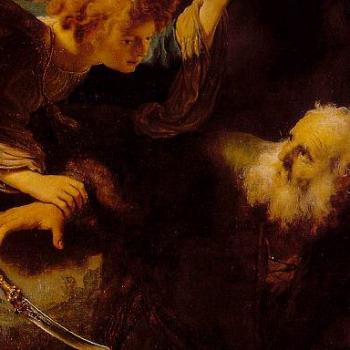
Note. This is a long-awaited continuation of a series that I began in December 2014 on John Calvin’s claims about the Mass in Institutes of the Christian Religion. You can find Part 1 here and Part 2 here.
Calvin made wild claims; but he got people to believe them, even today, which is wilder. This one–the Mass banishes the remembrance of Christ’s death!—is easily disproven for anyone who bothers to read the text of the liturgy. (Or even: for anyone who walks into a Catholic church and bothers to look at the crucifix or the Stations of the Cross.) Perhaps people are lazy and just take deceivers like Calvin at their word; I don’t know. But there’s a funny little part of the Mass called the Words of Institution. These were known as part of the Mass at least as early as Cyril of Jerusalem (4th century A.D.), if we may judge by his Catechetical Lectures.
Take this, all of you, and eat of it: for this is my body which will be given up for you. Take this, all of you, and drink from it: for this is the chalice of my blood, the blood of the new and eternal covenant, which will be poured out for you and for many for the forgiveness of sins. Do this in memory of me.
Luther told us to sin boldly, and Calvin sure lies boldly when he says the Mass has banished what it instructs the priest to say at every Mass: We’re doing this to remember Christ’s death.
Now, if the Roman missal said something like, “Don’t speak of that inconvenient episode on Calvary; we should all forget that. Make like this is a cocktail party. Do this in remembrance of last night’s revels, and let us quaff another,” Calvin may have had a point. But sadly, the priest at every Mass quotes from 1 Cor. 11:23-25.
Calvin writes:
I now come to the third part of the mass, in regard to which, we are to explain how it obliterates the true and only death of Christ, and drives it from the memory of men.
Was Calvin senile? Did he suffer schizophrenia? I must ask. At Mass, the priest says, now, you know, we’re doing this in memory of Christ’s death. And Calvin hears that and says, “Oh, this is obliteration! If you keep telling us to remember Christ’s death, no one will ever remember Christ’s death. It won’t occur to them. Catholics everywhere say to me, ‘You mean Christ died?'”
Perhaps even Calvin thinks he needs to explain himself lest he be thought a fool:
Now, what is the mass but a new and altogether different testament? [That is to say, “another gospel.”] What? Does not each mass promise a new forgiveness of sins, a new purchase of righteousness, so that now there are as many testaments as there are masses? Therefore, let Christ come again, and, by another death, make this new testament; or rather, by innumerable deaths, ratify the innumerable testaments of the mass.
So let me unpack this hysteria for you. Calvin’s trying some sleight-of-hand here. He has in mind the teaching that Christ’s death was a once-for-all sacrifice for sin. And that’s true enough; it comes from Heb. 10:10: “We are sanctified through the offering of the body of Jesus Christ once for all.”
So far so good. But Calvin vaults off and claims that each Mass is somehow a new forgiveness for sins and therefore not at all the same death of Christ that happened on Calvary. The Mass banishes the memory of that sacrifice, and replaces it with this brand new bastard sacrifice. The Mass sacrifices Christ, not once for all, but once and once again. And I’ll concede this much to Calvin: If he were right, it would indeed be an “impious and accursed dogma.”
But is he right?
•••
The first point to make is that this is not what Catholics confess—that the Mass is a re-sacrifice of Christ, or that a re-sacrifice is even necessary. Calvin published the Institutes in Latin in 1536, French in 1540, and definitive editions came out in 1559 and 1560. Concurrent with this, the Church had convened the Council of Trent in order to answer the claims of the Reformers. And here you may read what Trent had to say about the sacrifice of the Mass.
- In Chapter 1, Trent says that the “memory” of Christ’s sacrifice—you know, the one on Calvary—must “remain even unto the end of the world.”
There is no “banishing” the “memory” of anything, according to Trent. And indeed, if this were a new death, a new sacrifice, one could hardly speak of it in terms of “remembrance” at all.
- Canon 4 says that Christ’s sacrifice was “consummated” on the Cross. If it was “consummated” there, the Church can hardly teach that it happens all over again at every Mass.
The Eucharist begins with the priest recalling the night that Jesus was betrayed. This is to draw our minds to that night, that death, that sacrifice, and no other. Otherwise why speak of it at all? Why use the word “remembrance,” if you’re doing something new?
Thus the very words the Church uses in the Mass (and at the Council of Trent) belie the claims Calvin makes.
•••
The second point to make is that Calvin mixes up time with eternity. Lots of people do this, so Calvin shouldn’t feel too bad about it, wherever he might be.
When Hebrews 10:10 describes the crucifixion of Christ as a “once for all” sacrifice, it is speaking from the point of view of eternity. In one act, Christ died for all sins that would ever be committed by everyone who would ever live (and everyone who had ever lived, hitherto). He did it one time and need not do it again.
But Christ is eternal with the Father. He is outside time. Past, present, and future are all “now” to him. That is not so for you, not so for me, and not so for anyone else. Between last Mass and next Mass, I have sinned again. You have too.
Trent speaks to this when it says that the “salutary virtue” of Christ’s death must “be applied to the remission of those sins which we daily commit.”
If it were not so—if I did not require continual forgiveness for the sins which I continually commit; if I get forgiven in advance, then there’s really no need for me to try to reform my life, is there? Everything I will do is already covered; I can go out and wreak bloody vengeance in the street; once saved, always saved.
But no.
Christ’s death is one; and Trent says it. The bloody sacrifice was “once to be accomplished on the cross.” But it still needs to be applied to this moment, and to that moment. Because we live out redemption in time. From God’s perspective it is once-for-all; from my perspective, it is a process. That is why St. Paul says to work out your salvation.
•••
Calvin has an even wilder claim, if you can believe it; which is this: “If Christ is sacrificed at each mass, he must be cruelly slain every moment in a thousand places.”
I really must ask whether Calvin understood the omnipresence of God. Christ is, at this very moment, in Geneva, Switzerland; and he is also, at this very moment, in Alberta, Canada; and in Cairo. He is even, hard as it may be to fathom, in Washington, D.C. But I’m not speaking of four different Christs. And likewise, if the sacrifice of Christ occurs at Mass in St. Patrick’s Cathedral in New York, and at the same time in St. Peter’s Basilica, these are not two Christs or two sacrifices but one Christ and the same once for all sacrifice. If you can accept the former, the latter shouldn’t need to cause you difficulties.
What happened on Calvary in 33 A.D. is made present in 2019 at Mass. That is, in fact, precisely what the word “remember” means: to call up again. If I remember the days of my youth, I am not creating a different childhood. I am making my one childhood present for me today.
Far from the Mass “banishing the remembrance of Christ’s death,” the remembrance of Christ’s death is what the Mass is.












